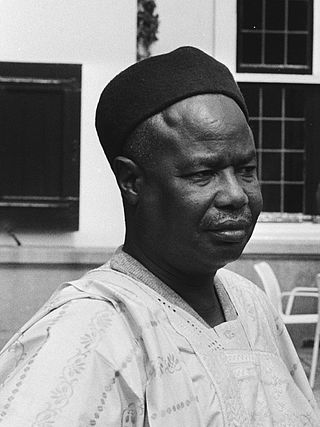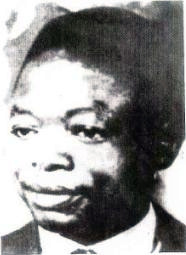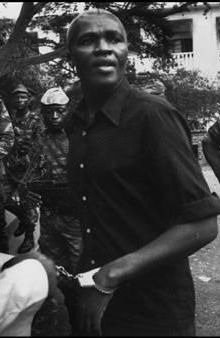Related Research Articles
At the crossroads of West Africa and Central Africa, the territory of what is now Cameroon has seen human habitation since some time in the Middle Paleolithic, likely no later than 130,000 years ago. The earliest discovered archaeological evidence of humans dates from around 30,000 years ago at Shum Laka. The Bamenda highlands in western Cameroon near the border with Nigeria are the most likely origin for the Bantu peoples, whose language and culture came to dominate most of central and southern Africa between 1000 BCE and 1000 CE.

British Cameroons or British Cameroon was a British mandate territory in British West Africa, formed of the Northern Cameroons and Southern Cameroons. Today, the Northern Cameroons forms parts of the Borno, Adamawa and Taraba states of Nigeria, while the Southern Cameroons forms part of the Northwest and Southwest regions of Cameroon.

The Cameroon People's Democratic Movement is the ruling political party in Cameroon. Previously known as the Cameroonian National Union, which had dominated Cameroon politics since independence in the 1960s, it was renamed in 1985. The national president of the CPDM is Paul Biya, the president of Cameroon, while the secretary-general of the party Central Committee is Jean Nkuete.

Ahmadou Babatoura Ahidjo was a Cameroonian politician who was the first president of Cameroon, holding the office from 1960 until 1982. Ahidjo played a major role in the establishment of Cameroon as a Neo-imperial state after the assassination of The Union Des Populations Camerounaise (UPC) by imperial France as well as integrating the French and English-speaking parts of the country. During Ahidjo's time in office, he established a centralized political system. Ahidjo established a single-party state under the Cameroon National Union (CNU) in 1966. In 1972, Ahidjo abolished the federation in favor of a unitary state. Ahidjo resigned from the presidency in 1982, and Paul Biya assumed the presidency. This was an action that was surprising to Cameroonians. Accused of being behind a coup plot against Biya in 1984, Ahidjo was sentenced to death in absentia, but he died of natural causes in 1989.
Articles related to Cameroon include:

John Ngu Foncha was a Cameroonian politician, who served as 5th Prime Minister of Cameroon.

Ruben Um Nyobè was an anti-colonialist Cameroonian leader, slain by the French army on 13 September 1958, near his natal village of Boumnyebel, in the department of Nyong-et-Kellé in the maquis Bassa.

Emmanuel Mbela Lifafa Endeley, OBE was a Cameroonian politician who led Southern Cameroonian representatives out of the Eastern Nigerian House of Assembly in Enugu and negotiated the creation of the autonomous region of Southern Cameroons in 1954.
The National Union for Democracy and Progress is a political party in Cameroon, drawing its main support from the north of the country. It was established as an opposition party in the early 1990s and won the second largest number of seats in the 1992 parliamentary election. The UNDP's National President is Maigari Bello Bouba, who is currently a Minister of State in the government.
The Cameroonian Union was a Cameroonian pro-independence party active in the French territory of Cameroun.

Parliamentary elections were held in Cameroon on 24 April 1964. They were the first elections held after Southern Cameroons became part of the country in 1961. The result was a victory for the Cameroonian Union (UC), which won 40 of the 50 seats. The UC and the Cameroonian Party of Democrats only contested the 40 seats East Cameroon, while the Kamerun National Democratic Party and Cameroon People's National Convention contested the ten seats in West Cameroon. The elections were marred by severe irregularities.

French Cameroon, also known as the French Cameroons, was a French mandate territory in Central Africa. It now forms part of the independent country of Cameroon.

Simon Pierre Tchoungui was a medical doctor who was appointed Prime Minister of East Cameroon from October 1965 until 20 May 1972, when the United Republic of Cameroon came into being.

Ernest Ouandié was a leader of the struggle for independence of Cameroon in the 1950s who continued to resist the government of President Ahmadou Ahidjo after Cameroon became independent in 1960. He was captured in 1970, tried and condemned to the death. On 15 January 1971, he was publicly executed in Bafoussam.
Tankeu Noé was a member of the Union of the Peoples of Cameroon (UPC) guerrilla forces in Cameroon fighting first against French colonial government and then against the government of Ahmadou Ahidjo in the Douala region.

The Kamerun National Congress (KNC) was a political party in Southern Cameroons.
The Cameroon War is the name of the independence struggle between Cameroon's nationalist movement and France. The movement was spearheaded by the Cameroonian Peoples Union (UPC). Even after independence, the rebellion continued, shaping contemporary politics. The war began with riots in 1955 and continued after Cameroon gained independence in 1960. Following independence, the first President of Cameroon, Ahmadou Ahidjo requested continued French military intervention to fight the UPC rebels. The UPC rebellion was largely crushed by the Cameroonian Armed Forces and French Army by 1964. This war is often forgotten because it occurred at the height of France's biggest colonial independence struggle, the Algerian War.

Augustine Ngom Jua was the prime minister of the state of West Cameroon in the Federal Republic of Cameroon from 13 May 1965 to 11 January 1968.

The Anglophone problem is a socio-political issue in the modern Republic of Cameroon, rooted in the country's German, British, and French colonial legacies. Anglophone (English-speaking) Cameroonians form a minority population of around 16 percent, mainly from the Northwest and Southwest regions that formerly constituted the Southern Cameroons, part of the former British Cameroon colonies. These Anglophone regions were formerly controlled by Britain as a mandate of the League of Nations, and then as a United Nations trust territory. During the Foumban Conference of 1961, territories with different colonial legacies were finally united into one state.
References
- 1 2 3 4 Julius Atemkeng Amin, The Peace Corps in Cameroon, Kent State University Press, 1992.
- ↑ Christof Heyns, Human Rights Law in Africa: 1996 , p. 137
- 1 2 3 4 H. Pick & B. Bloom, 'Cameroon', C. Legum, Africa Handbook, Penguin, 1969.
- 1 2 Edith Brown Weiss & Harold Karan Jacobson, Engaging Countries: Strengthening Compliance with International Environmental Accords, MIT Press, 1998, p. 442
- ↑ Biography OF Dr. Victorin HAMENI BIELEU, National Chairman of the Union of Democratic Forces of Cameroon (UFDC) [ permanent dead link ]